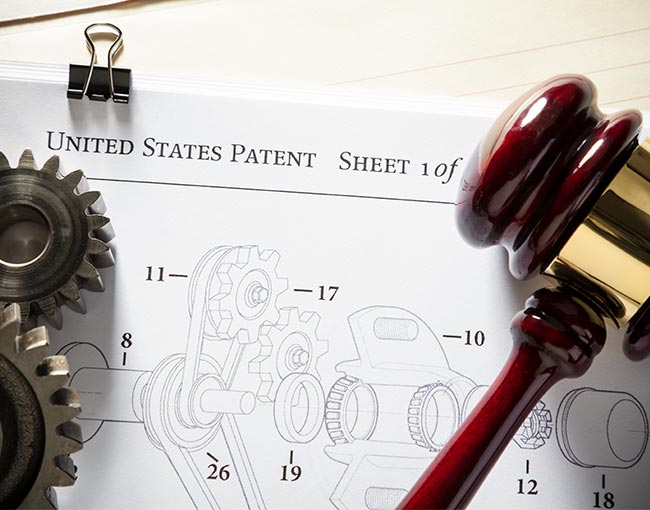Home > Insights > Publications > PTAB offers clarification on inter partes review and state sovereign immunity
June 20, 2019 update: The PTAB decision discussed below has since been affirmed by the Federal Circuit on different grounds, holding that states are not entitled to sovereign immunity in inter partes review proceedings. The Federal Circuit’s decision is discussed here.
The topic of sovereign immunity has been raised a number of times in recent months in inter partes review (“IPR”) proceedings. In these proceedings, the Patent Trial and Appeal Board (“Board”) has addressed whether state sovereign immunity as reflected in the 11th Amendment to the Constitution bars the Board from adjudicating a private party’s challenge to a patent owned by a state entity. While the patent owner has indicated that it will appeal the decision, the Board recently addressed this question in Ericsson Inc. v. Regents of the University of Minnesota, Case IPR2017-01186, Paper 14 (PTAB Dec. 19, 2017).
The decision is notable because Chief Judge Ruschke expanded the panel from the normal three administrative patent judges to seven judges, including himself and the Deputy and Vice Chief Administrative Patent Judges, and he wrote the opinion. It thus would not be surprising if this opinion is designated as precedential in the near future. In any event, it is highly likely that future panels will rely upon this decision.
State sovereign immunity applies to IPR proceedings
The opinion resulted from a motion to dismiss filed by the patent owner, Regents of the University of Minnesota, claiming that the proceeding was barred by state sovereign immunity. The petitioner did not dispute that the patent owner is a state entity that can claim sovereign immunity. Thus, the first issue for the Board was whether sovereign immunity applies to IPR proceedings. On this issue, the Board agreed with past panels, finding the immunity does indeed apply.
Specifically, the Board compared IPRs to other administrative proceedings. See Paper 14, at 5. The Board noted that the Supreme Court had decided that state sovereign immunity applies to administrative adjudications initiated by private parties in Federal Maritime Commission v. South Carolina State Ports Authority, 535 U.S. 743 (2002), which Thompson Coburn partner Warren Dean argued. It further noted that the U.S. Court of Appeals for the Federal Circuit had ruled that state sovereign immunity was available in interference proceedings before the predecessor to the Board. See Vas-Cath, Inc. v. Curators of Univ. of Mo., 473 F.3d 1376 (Fed. Cir. 2007). Accordingly, the Board confirmed that state sovereign immunity does apply in IPR proceedings.
Immunity in an IPR proceeding Is waived by filing a patent infringement action
The second issue addressed by the Board — which was one of first impression — was whether the University of Minnesota waived its immunity in the IPR proceeding by filing an action for patent-infringement of the challenged patent against the petitioner in federal district court. On this issue, the Board ruled in the affirmative, finding there indeed had been waiver.
In making its decision, the Board analogized the case to Regents of University of New Mexico v. Knight, 321 F.3d 1111 (Fed. Cir. 2003). There, the Federal Circuit found a State waived its 11th Amendment immunity as to compulsory counterclaims (e.g., a counterclaim of invalidity) by filing an action for patent infringement in district court. Id. The Federal Circuit explained that “because a state as plaintiff can surely anticipate that a defendant will have to file any compulsory counterclaims or be forever barred from doing so, it is not unreasonable to view the state as having consented to such counterclaims.” Paper 14, at 8 (quoting Knight, 321 F.3d at 1126) (emphasis added by Board). Here, the Board found an IPR is similar in that “a party served with a patent infringement complaint in federal court must request an inter partes review of the asserted patent within one year of service of that complaint or be forever barred from doing so.” Id. (emphasis in original). The Board thus found that by filing an infringement action, the State waived immunity, and that holding otherwise would be unfair to the petitioner.
The Board also rejected the patent owner’s argument that sovereign immunity was limited to the forum of the patent-infringement action (i.e., in the district court action). The Board distinguished the cases raised by patent owner on this point, because none “address[ed] waiver with respect to separate proceedings in a single forum created by Congress, such as the post-issuance review proceedings under the AIA.” Paper 14, at 10. The Board also found that while the petitioner could assert invalidity in the district court, IPRs are different enough from such a counterclaim in district court that “barr[ing] Petitioner from obtaining the benefits of an inter partes review of the asserted patent would result in substantial unfairness and inconsistency.” Id. at 11. It thus found that state sovereign immunity had been waived, and the IPR could therefore proceed.
This portion of the decision, that sovereign immunity in an IPR proceeding is waived by filing an infringement action in federal court, may prove controversial on appeal. Waivers of sovereign immunity, whether state or federal, are typically forum specific, and the Board did not cite any direct precedent for its ruling. In addition, what is or is not “substantial unfairness and inconsistency” may well depend upon one’s perspective.
The vast majority of district court actions and IPRs don’t involve state entities. For those proceedings, this case will have little impact. But for the sizable few that do involve state entities entitled to sovereign immunity (e.g., state universities), under the Board’s decision (assuming it is upheld), state entities won’t be able to assert sovereign immunity in an IPR proceeding if they have brought an infringement action against the petitioner.
Tony Blum represents clients before the USPTO in post-grant proceedings and litigates patent infringement suits throughout the country.

